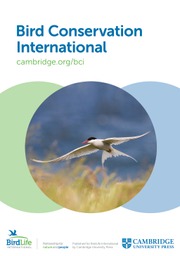Article contents
Status, diversity and trends of the bird communities in Volcanoes National Park and surrounds, Rwanda
Published online by Cambridge University Press: 16 May 2019
Summary
The Volcanoes National Park (VNP) in Rwanda, part of the Virunga massif in the Albertine Rift region, boasts some of Rwanda’s best remaining natural vegetation and is home to many endangered and endemic species. The park has suffered from high levels of degradation and destruction, reducing in size by 50% during the 1960s and 1970s, and remains under threat from illegal activities, human population pressure and climate change. This study is the first to investigate the status and trends of bird communities in the VNP, using a multi-year dataset. We use a five-year dataset, totalling over 3,200 point-counts, both within and around the VNP, to assess the conservation value of the VNP for birds in comparison with other national parks and non-protected areas. We assess bird communities and population trends within and around the parks and identify important habitat factors for birds within the VNP. We found that the VNP hosts a unique bird community compared to other localities, with several Albertine Rift endemics and threatened species occurring in the VNP. Hagenia/ Hypericum woodland, herbaceous vegetation, brush ridge and mixed forest host the highest levels of bird diversity in the VNP, whilst the park’s waterbodies provide key habitat for the endangered Albertine Rift endemic Grauer’s Swamp-warbler (Bradypterus graueri). Elevation had a negative effect on bird diversity in the VNP, whilst the basal area of dead trees, Hagenia and vines had a positive effect. Both inside and outside the VNP, there was a significant decline in abundance and species richness over the sampling years; however, we advocate for further monitoring to confirm these trends. Based on our findings, we recommend effective, targeted management of key habitats for birds within the park, including those identified in this study, in order to mitigate bird declines and conserve the unique bird communities in the VNP.
- Type
- Research Article
- Information
- Copyright
- Copyright © BirdLife International 2019
Footnotes
Present address: Karisoke Research Centre, The Dian Fossey Gorilla Fund International, NR 4 RD 58, B.P. 105 Ruhengeri/Musanze, Rwanda.
and The Dian Fossey Gorilla Fund International, 800 Cherokee Ave SE, Atlanta, GA 30315, USA.
References
- 6
- Cited by


